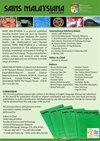The Prediction of Landslide Slip Surface Based on the Correlation Between Relative Density and Dynamic Cone Penetration Test
IF 0.8
4区 综合性期刊
Q3 MULTIDISCIPLINARY SCIENCES
引用次数: 0
Abstract
Relative density is one of the most important properties indicating the strength and state of compaction of the soil. The dynamic cone penetration test is considered one of the fastest field tests for evaluating the relative strength of soil layers, including density. In this study, an attempt is made to correlate the relative density of the landslide soil with the dynamic cone penetration results. The aim of this study was to delineate the boundary between moving and in-situ soil for the prediction of slip surfaces and finally to conceptualise the underlying mechanism behind the initiation of a landslide. The results of the penetration tests give an increasing index of 1.9 - 2.4 cm/blow, 2.8 - 3 cm/blow and 3.2 cm/blow for the upper, middle and lower parts (toe), respectively. Using the correlation equation, the calculated relative density in the field was found to agree well with the relative density measured in the laboratory with a standard deviation of ±1.5%. The relationship between the relative density and the penetration index shows an inverse relationship where the resistance of the soil to dynamic penetration increases as the relative density of the soil increases, thus decreasing the penetration index. This result can be used to accurately conceptualize the mechanism behind a landslide using a simple and rapid field device.基于相对密度和动态锥入试验相关性的滑坡滑动面预测
相对密度是表示土壤强度和压实状态的最重要特性之一。动态锥入度试验被认为是评估土层相对强度(包括密度)最快的现场试验之一。本研究试图将滑坡土壤的相对密度与动态锥入度结果联系起来。这项研究的目的是划定移动土壤和原位土壤之间的界限,以预测滑动面,并最终构思出滑坡发生背后的基本机制。渗透试验结果表明,上部、中部和下部(坡脚)的上升指数分别为 1.9 - 2.4 厘米/冲击波、2.8 - 3 厘米/冲击波和 3.2 厘米/冲击波。利用相关方程,发现实地计算的相对密度与实验室测量的相对密度非常吻合,标准偏差为 ±1.5%。相对密度与渗透指数之间的关系显示出一种反向关系,即随着土壤相对密度的增加,土壤对动态渗透的阻力也随之增加,从而降低了渗透指数。这一结果可用于利用简单、快速的现场设备准确概念化滑坡背后的机理。
本文章由计算机程序翻译,如有差异,请以英文原文为准。
求助全文
约1分钟内获得全文
求助全文
来源期刊

Sains Malaysiana
MULTIDISCIPLINARY SCIENCES-
CiteScore
1.60
自引率
12.50%
发文量
196
审稿时长
3-6 weeks
期刊介绍:
Sains Malaysiana is a refereed journal committed to the advancement of scholarly knowledge and research findings of the several branches of science and technology. It contains articles on Earth Sciences, Health Sciences, Life Sciences, Mathematical Sciences and Physical Sciences. The journal publishes articles, reviews, and research notes whose content and approach are of interest to a wide range of scholars. Sains Malaysiana is published by the UKM Press an its autonomous Editorial Board are drawn from the Faculty of Science and Technology, Universiti Kebangsaan Malaysia. In addition, distinguished scholars from local and foreign universities are appointed to serve as advisory board members and referees.
 求助内容:
求助内容: 应助结果提醒方式:
应助结果提醒方式:


